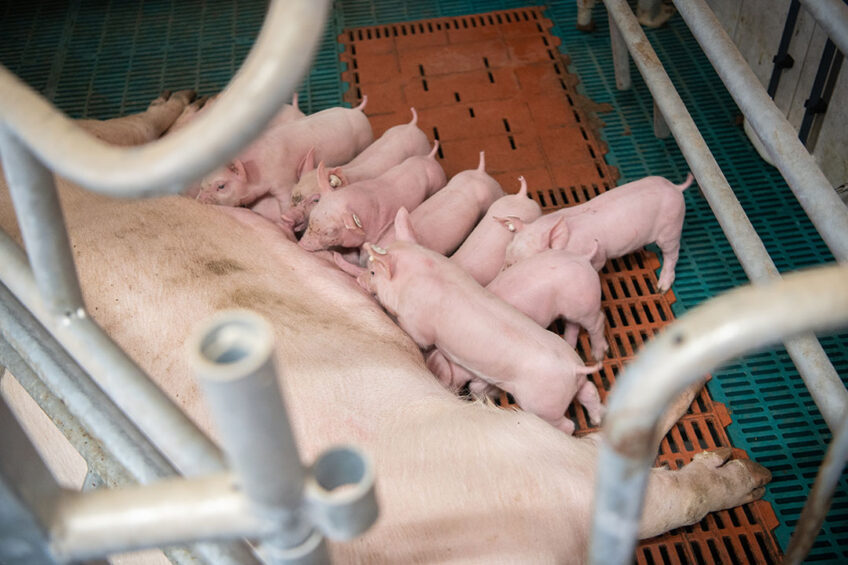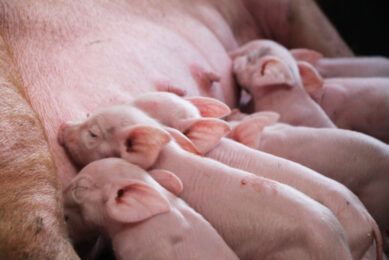How to use ketoprofen as an alternative to tolfenamic acid

Researchers from Thailand evaluated the effects of a postpartum ketoprofen treatment on the incidence of post-parturient disorders in sows. The also looked at feed intake, sow colostrum yield, piglet colostrum intake, and piglet mortality rate during the first 3 days of postnatal life.
Prolonged parturition is an important animal welfare issue. It causes inflammation, pain, post-parturient disorders, reduced feed intake, and reproductive performance in hyperprolific sows. This compromises colostrum intake, and the survival rate of newborn piglets. Immediate inflammation and pain management after farrowing reduces the risk of postpartum complications in sows. It also enhances their colostrum quantity and quality during early lactation. Ketoprofen is a non-steroidal anti-inflammatory drug with analgesic, anti-inflammatory and antipyretic properties.
Data collection
The research team used 61 Danish Landrace × Yorkshire crossbred multiparous sows and their offspring, including 833 piglets. They randomly distributed sows into 2 groups. The team treated the first group with tolfenamic acid for 2 days postpartum. The second group received ketoprofen for 2 days postpartum.
The sows received the first doses of tolfenamic acid and ketoprofen within 1 hour postpartum. The team repeated administration within 24 hours after the first one. They defined the farrowing process as the interval from the expulsion of the first piglet to the last piglet born. Farrowing assistance including manual extraction of the piglets and administration of oxytocin intramuscularly was performed when the expulsion interval exceeded 45 minutes.
The sow parameters collected included gestation length, farrowing duration, total number of piglets born per litter, number of piglets born alive per litter, number of stillborn piglets per litter and number of mummified fetuses per litter. In addition, the team collected postpartum sow characteristics, including the occurrence of postpartum dysgalactia syndrome, abnormal vaginal discharge, post-parturient fever, and daily feed intake of sows. The piglet parameters recorded during the study consisted of birth order, birth interval, birth weight, body weight at 24 hours postpartum and piglet mortality during the first 3 days of postnatal life. The researchers classified piglets according to body weight at birth into 3 groups: low, moderate, and high. The also estimated piglet colostrum intake and sow colostrum yield.
Impact of ketoprofen on sow parameters
Prolonged farrowing duration increased the incidence of fever at day 2 postpartum and the incidence of abnormal vaginal discharge. Intramuscular administration of ketoprofen postpartum alleviated the pain caused by the prolonged parturition process and improved the sow ability to initiate lactation properly and provide enough colostrum to their offspring during the first 24 hours after farrowing. In addition, the proportion of stillborn piglets per litter was relatively high in both tolfenamic acid and ketoprofen groups. The incidence of postpartum dysgalactia syndrome in the sows treated with ketoprofen was lower than sows treated with tolfenamic acid.
Impact of ketoprofen on piglet parameters
In this study, 20.8% of the piglets had inadequate colostrum intake suggesting that intensive care during the first 24 hours postpartum needs to be improved to decrease sow illness and to enhance their lactation capacity. Piglets with low birth weight had a lower colostrum intake per kg of body weight than the rest of piglets indicating that it is essential to take care of small piglets to improve their ability to access teats and consume adequate amounts of colostrum. The mortality rate during the first 3 days of postnatal life in the piglets that had adequate colostrum intake was lower than those in piglets with inadequate colostrum intake.
Impact of ketoprofen on colostrum yield
In both groups, the colostrum yield of sow parity numbers 3 to 5 was higher than that of sow parity numbers 6 to 9. The colostrum yield of multiparous sows was positively correlated with the number of piglets born alive per litter and the rectal temperature during the first 3 days postpartum and negatively correlated with the percentage of stillborn piglets per litter.
The authors concluded that “administration of ketoprofen in postpartum sows for 2 days can control the evidence of post-parturient disorders in sows as effectively as the use of tolfenamic acid.”











